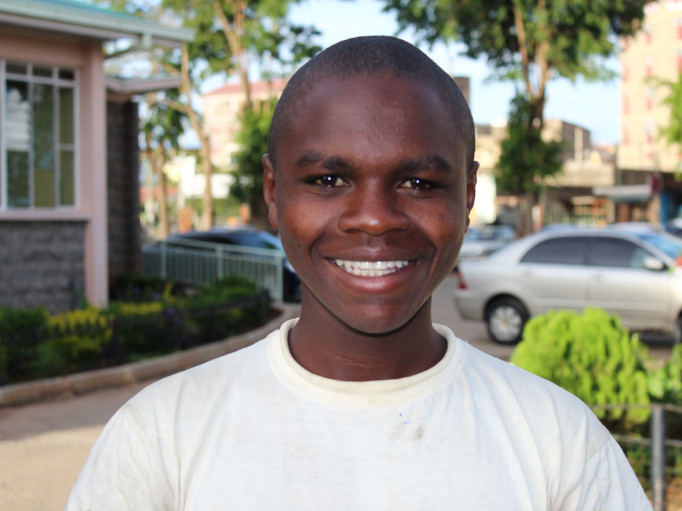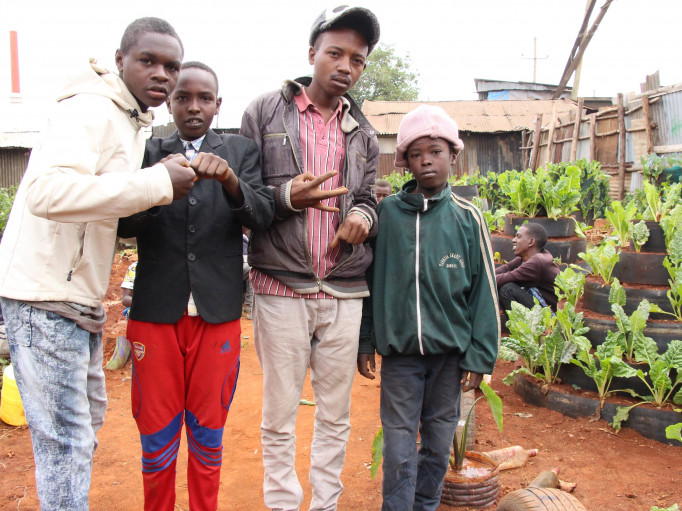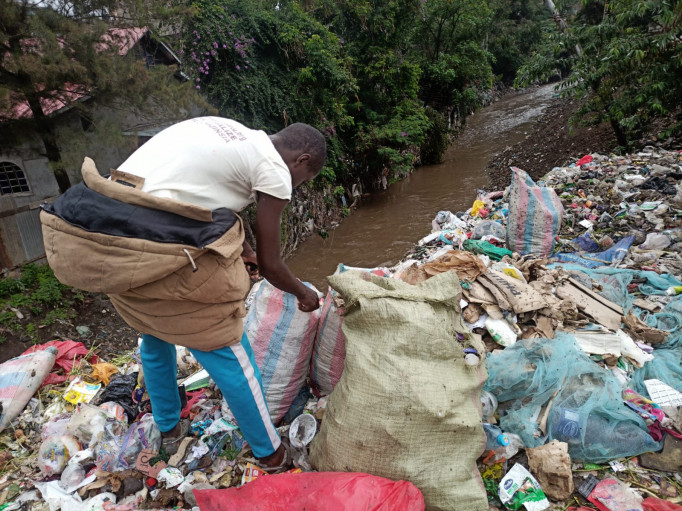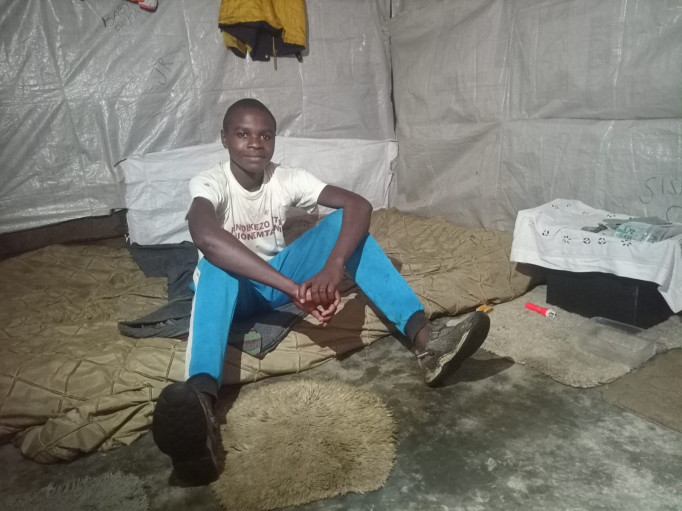“Before the project I didn’t know there was a problem with me. I had stayed for so long on the streets - that was the only life I knew. I believed that was my fate, I guess.” Mabling, 17

For the past 10 years, 17-year-old Mabling has lived hand-to-mouth on the streets, scavenging scrap to sell. Here he shares his life story in his own words.
Driven to the streets by poverty and loneliness
“When I was young, I used to live with my mother in a dangerous part of the Korogocho slums. My mother sold beer in a nightclub and used to leave me alone in the house. Since I had not been enrolled to school, it was boring being at home all day. I was often hungry because my mother could not always afford food. I could see other children moving around collecting scrap metal and plastics to sell, so I started running away from home to join them during the day and began working with them. I hated being left alone at night by my mother when she went to work, so eventually I started sleeping out on the streets with them rather than going home to sleep alone.”
Attempted reconciliation
After a few years on the streets, Mabling tried to go back home to his mother.
“When I went back, the place where our house used to be had been demolished, I did not know where my mother had moved to. I tried asking her friends, but they also did not know. In fact, they were asking me where my mother had moved to. For a week I slept outside near where our house used to be, hoping somehow, she could come. Eventually I gave up looking for her and went back to the streets. Since then, I have never seen my mother…. it is about 8 years now. I don’t even know whether she’s got other children - or whether she is alive or dead. I really hope one day I will see her again”
Starting at the project
Around two years ago during a street outreach session, staff from PKL (Toybox’s local partner in Nairobi) visited the street base* where Mabling was living at the time.
“Madam Magdalene (the project officer) came to our base and told us that Pendekezo Letu (PKL) were interested in working with us. She told us we would be discussing our lives on the streets, the challenges we faced and how we could change our lives. She invited those who were interested to meet later at the church compound. I wanted to know how the project would help us and decided to join.”
Since his first encounter with the outreach team, Mabling has been regularly attending a variety of different project activities which have helped him understand his rights and learn a variety of key life skills. He has also been involved with the urban farm initiative which is protecting children and young people from some of the extreme challenges associated with the current rising cost of living, such as hunger and malnutrition. Through the project, children are growing healthy and nutritious food, and have a safe place to spend their time, away from the dangers of the street.
“My eyes were opened after coming to the project, that’s when I realised the life I was living was not the best and I needed to do something meaningful with my life. I enjoy going to the farm – it feels good to work there. People are calm and there is less conflict”

The impact of the cost-of-living crisis
In recent months, global economic problems have wrought terrible devastation in the world’s poorest communities. Against this backdrop, it has become increasingly challenging for Mabling to earn enough for even the most basic essentials.
“Right now there are so many people who are collecting plastics and metals, not just street boys. In the past you could go around for two - three hours and have enough. Now I wake up at around 4.30am to go and collect. You can work until midday and still not have enough. There are also many fights over territory – people get beaten up badly if they are seen in other people’s areas. Things are way harder. You can no longer go to the dumpsite to scavenge because the managers at the site are only allowing specific people there. Now we mostly depend on going around the community to collect scrap and there’s not usually much. These days it’s very hard to find scrap metals - plastics and cartons are more common. They are bought at a lower price, so we are making less money.”
Not only has it become even more difficult for Mabling to make a living, the work he undertakes is also putting his personal safety and health at risk.
“Sometimes we get injured by sharp objects and the wounds take a long time to heal. We are often accused of stealing, because some people masquerade as street children and steal items from the community - we become the suspects and are beaten”

Positive life changes
Despite the challenges he continues to face on a daily basis, it’s clear Mabling is working incredibly hard to turn his life around and become less dependent on the streets. During the past two years he has made some profound changes to the way he lives his life.
“My greatest learning is that using drugs affect your body negatively. When I joined the project, I was using many drugs, and they made my life miserable. I learned that if I stopped using drugs, my life would be better. Since the beginning of 2023 I have not used anything. Being sober is helping me think more about my future. Before all that mattered was having food and money for drugs, but now I have goals for my life. I started saving money that I was using for drugs and rented a small room with a friend. I then realised he was not good company, so I told him to leave and go rent his own house. Now I am more conscious of who my friends are. I got a small mattress from the dumpsite and someone gave me a blanket. I’m happy that I’m no longer sleeping under the kibanda.** I hope to save enough and buy a bed, a stove and two pans so that I start cooking for myself. That way I can save on what I use for buying food, because I can be get vegetables from the project. Before I came to the project I didn’t care how I looked. I rarely changed clothes and used to bathe once in a week at the river. In fact, I was just taking a dip, not really bathing. Now I buy soap and bathe regular, I even buy clothes at the market to change into. When you are clean, people treat you differently. Now I feel hopeful - that I can do something meaningful with my life, just like other people, and live a better life. I’m a hard worker - everything I do, I do with all my heart.”

PKL are currently working to support Mabling to get his birth registration documentation, which will greatly support his plans for the future.
“I look forward to having an ID card soon– to help me enrol in a mechanic course and hopefully earn some money by doing a better job than I’m currently doing. I could then afford a better house, to marry, and have 2 or 3 children-or whichever number God can give me. I don’t want my children to pass through the life I’ve been through. I want to be a role model to them so that I may once take them to a base* and tell them, ‘Do you see those street children using drugs? I was once one of them.”
To make a donation to support children and young people like Mabling survive the rising cost of living across the world, please visit www.toybox.org.uk/give
*Children on the streets in Nairobi live with peers/family in groups in open spaces they identify as safe. These ‘bases’ are normally located in unused public spaces such as flyovers or disused land.
**Raised wooden stalls where most street connected boys sleep.